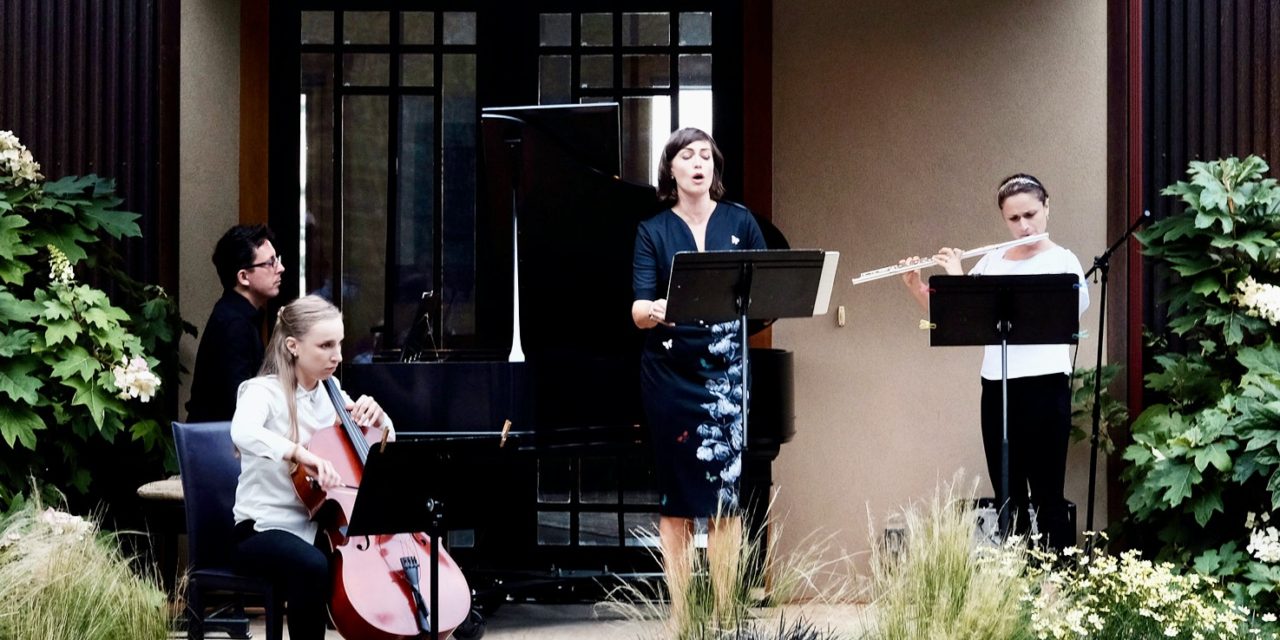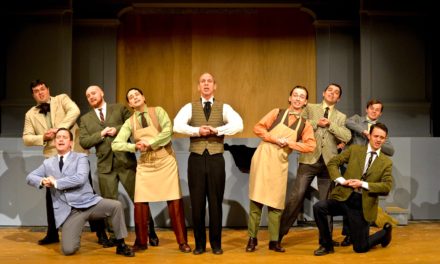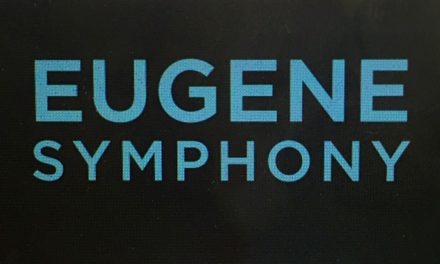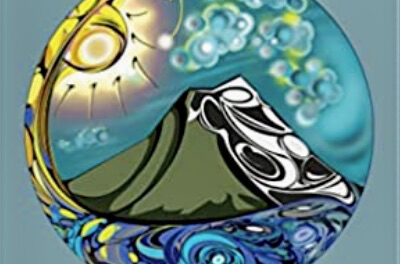(Above: Soprano Erika Rauer, also the executive director of Eugene Opera, performed in the third of nine concerts in the Hope on the Butte concert series, accompanied by pianist Eduardo Moreira. In the piece shown here, they were joined by cellist Kathryn Brunhaver and Victoria Calderone Moreira on flute and piccolo. Photos by Paul Carter for Eugene Scene.)
By Randi Bjornstad
Not everyone can boast a back yard that can double as an outdoor amphitheater for concerts, but Anice Thigpen and Andrea Halliday’s property southeast of Eugene off Fox Hollow Road can, and does.
This summer, the couple is three concerts into a nine-concert series titled Hope on the Butte, which so far has included the Elsewhere Ensemble (music, stories, poetry, and theater), musicians Kathryn Brunhaver and Grant Mack (cello and piano), and Erika Rauer and Eduardo Moreira (soprano and piano).
The most recent showed a side of Rauer — whose day job is executive director of Eugene Opera — that some may not have encountered yet. While much of her career has been devoted to arts administration, production, and education, before that she was an soprano opera singer in her own right. In Germany, Rauer sang the part of Salome in a one-act opera of the same name by Richard Strauss, based on a play (translated into German by Hedwig Lachmann) that was written in 1891 by none other than the multi-talented and notorious Oscar Wilde. Her appearances in the United States have included singing with Opera Boston, Tanglewood Music Festival, Opera Company of Philadelphia, and Gotham Chamber Opera, among others.
Songs of life, love, and elegy
At the third Hope on the Butte concert on a hot Saturday afternoon in July, Rauer’s program offered three distinctly different musical offerings, composed individually by Robert Schumann, Maurice Ravel, and George Crumb. What made them especially accessible to the audience was the provision of the text, with the original language in one column and a line-by-line English translation in the other.
Eduardo Moreira provided piano accompaniment — playing the instrument in the Crumb set literally from both inside and out. In the Ravel portion of the program, the two were joined by cellist Kathryn Brunhaver and Victoria Calderone Moreira on flute and piccolo.
The Schumann piece, written in German and translated in English as A Woman’s Love and Life, took the audience through the life of a young woman as she meets the man she will marry and grows out of her youthful ways. She describes him in superlatives, wonders at her good fortune that they will be husband and wife, prepares with her female friends for her wedding, shares her joy at married life and the announcement to him that they will be parents, finds herself in rapture at the delights of new motherhood, and withdraws from her happy world at the premature death of the man she loves.
Completely different, the Ravel offering, written in French and translated as Songs of Madagascar, expresses the passion a man feels, describing the night with its full moon and nocturnal bird song as he waits for his lover to arrive for an ardently awaited tryst. In a t0tally different vein, the second part of Ravel’s segment recalls the history of Madagascar, when white men first came to their shores, falsely claiming friendship but quickly becoming enemies who with military might enslaved them until eventually their own gods “fought on our behalf, hurled rains upon them, storms and poisoned winds until they were gone.” The last expresses the satisfaction of a man at the end of his long work day, listening to the talk of women as they prepare food and await the evening breeze and the rising moon above the trees.
It was the final section of the program, Crumb’s Apparition, based on Walt Whitman’s When Lilacs Last in the Dooryard Bloom’d, that most stretched both Rauer’s and Moreira’s abilities to experiment with non-standard and difficult vocalizations and instrumental methods. It is a song of night that recognizes and even welcomes the approach of the inevitable end of life:
Come lovely and soothing death/Undulate round the world, serenely arriving, arriving/In the day, in the night, to all, to each/Sooner or later, delicate death.
Still more to come
With nine total concerts on the series calendar, there is much more music to experience through Hope on the Butte.
Next up on the list is a flute and piano performance at 6 p.m. on Aug. 7, featuring Victoria Calderone Moreira and once again, Eduardo Moreira.
Halliday and Thigpen handle this series through their own production company, A-Squared Productions, and they donate the proceeds to a nonprofit organization that assists people in need of shelter or other support.
Concertgoers purchase tickets on a sliding scale basis through the A-Squared website, drive up a winding gravel road through the woods — with occasional glimpses of deer — to a parking area, where they either can walk the remaining short distance up the hill, wait for a car to shuttle them to the top, or in cases of special needs in terms of mobility, park at the top just outside the house.
Once there, audience members choose their spots, spreading out blankets or cushions on the more sloping portions of the yard or setting up folding chairs where it’s flatter. Some bring picnics or snacks, others come supplied with wine or water bottles. Wine or beer also may be purchased by donation.
Thigpen is the primary greeter, and in inimitable style delivers a spirited introduction to the day’s program.
Ticket sales are limited to 45 because of continuing variability in local pandemic rules so that people can distance themselves appropriately, and mask-wearing also will be observed in accordance with state requirements in effect a the time of each concert.
Should the weather not cooperate, the concerts can move inside, where Thigpen says at least 45 people can be accommodated even with 6-foot social distancing between groups. It should be noted that the final concert in October, featuring tenor Brian Haimbach, will be performed indoors.
A-Squared originally had planned for a much larger performance this summer, Birds Flying Through, that would have incorporated poetry, song, and dance, that has been postponed to September 2022 because of the uncertainty of holding safe gatherings this year.
Concert Series: Hope on the Butte
Location: 32111 Fox Hollow Road, Eugene (map available on website; see below)
Remaining performances:
- Aug. 7 (6 p.m.) — Victoria Calderone Moreira and Eduardo Moreira; flute and piano
- Aug. 21 (6 p.m.) — Laura Wayte and Nathalie Fortin; vocal and piano
- Sept. 4 (5 p.m.) — Terra Nova Trio; chamber music ensemble (Sandy Holder, Mike Curtis, Annalisa Morton)
- Sept. 18 (4 p.m.) — Kimberlee Uwate; cello
- Oct. 2 (4 p.m.) — Delgani String Quartet; string quartet (Jannie Wei, Wyatt True, Kimberlee Uwate, Eric Alterman)
- Oct. 16 (4 p.m.) — Brian Haimbach (director, writer, performer)
Tickets and Information: Sliding scale $0 to $40; proceeds benefit local nonprofit organizations, available at https://www.asquaredarts.com/hope-on-the-butte
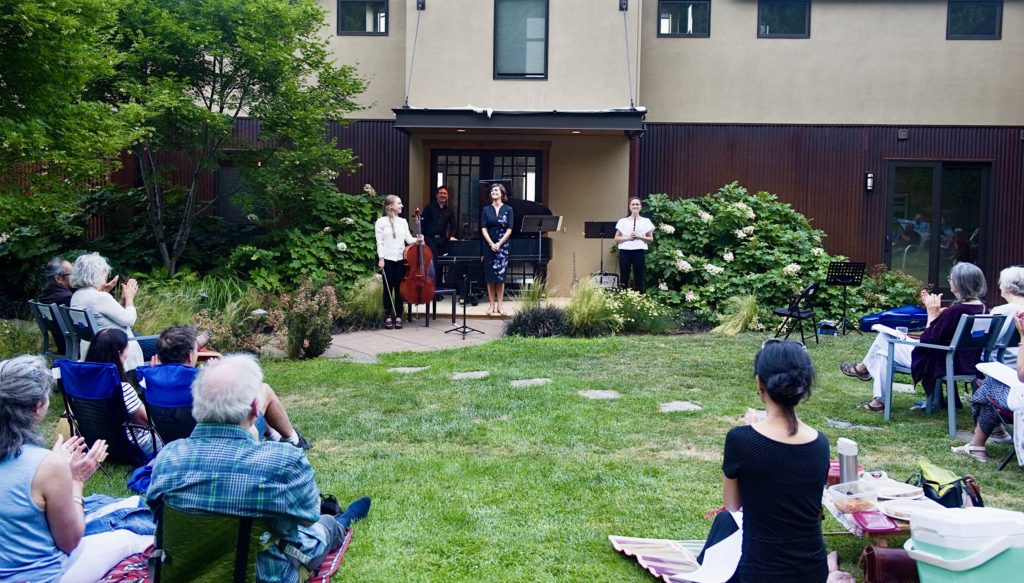
A southeast Eugene back yard becomes a natural amphitheater for a concert series called Hope on the Butte.

